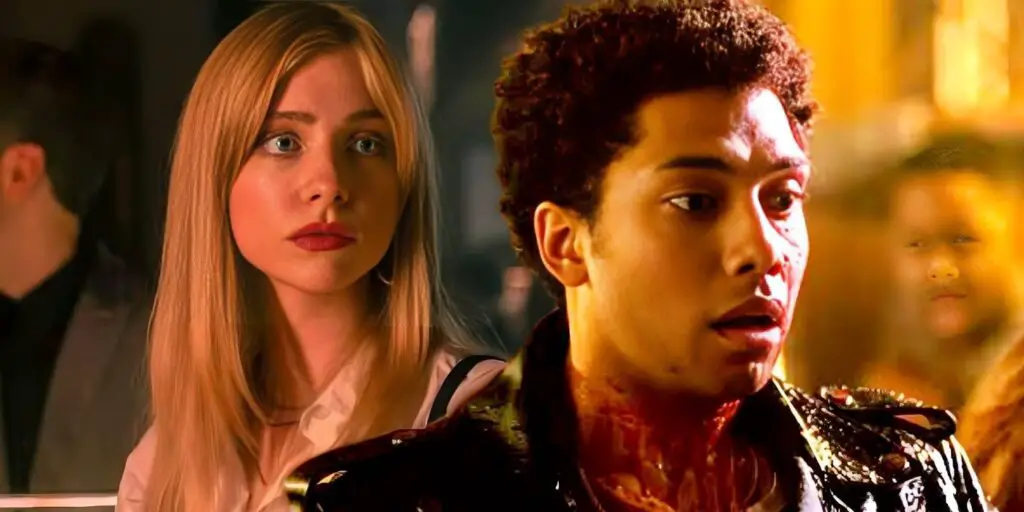In the groundbreaking Season 1 finale of “Gen V“, a captivating revelation comes to light, intricately linking the superpowers of the main characters to their mental health struggles. This narrative thread, subtly woven through the series, reaches a crescendo in the final episode, offering a profound commentary on the inner battles of these superheroes.
The show, from its onset, subtly indicates this connection. For instance, Emma’s power, reminiscent of Ant-Man, is not just a mere ability to shrink, but a reflection of her internal perception of self-worth, often triggered by an act of throwing up. Marie, another central figure, showcases her power through self-harm, an act of draining her own blood, symbolizing a deeper turmoil.
Jordan Li’s unique bi-gendered superpower serves as a poignant metaphor for their transgender identity struggles, adding a layer of depth to the character’s journey. Similarly, Cate’s ability to control others aligns with her internal feelings of helplessness and detachment, portraying her as a vulnerable target in a world of manipulative forces.
Andre, who initially appears as an exception in this pattern, is later revealed to share this allegory. His storyline evolves significantly in the finale, bringing to light the mental and physical toll of his powers, which are metaphorically linked to his father’s neurological damage from decades of using similar abilities. The once-perceived blessing of their powers gradually unveils as a curse, hinting at the potential fatal consequences if Andre pushes his abilities beyond a certain threshold.
As the narrative progresses, the show subtly indicates that Andre’s powers come with a heavy price. His visit to his father in the finale’s eighth episode reveals early signs of brain damage, a direct consequence of his powers’ usage. The doctor’s inquiries about symptoms like lightheadedness or spots in his vision, and Andre’s affirmative reactions, confirm that his abilities are gradually taking a toll on him. Despite his father enduring decades before experiencing serious consequences, Andre faces a similar risk, with even minor exertions like controlling a helicopter hinting at the possibility of grave injury or death.
The finale also delves into Andre’s personal conflicts, particularly his internal struggle with decisions that polarize his life. His relationship dynamics with Luke and Cate, and the burden of carrying his family’s legacy forward, all reflect the mental burden he bears. This is further symbolized by his father’s request for him to don the Polarity suit, an ironic nod to Andre’s life being a series of polar choices.
Andre’s Journey: A Tale of Power, Responsibility, and Inner Conflict

The finale of “Gen V” brings a nuanced exploration of Andre’s character, unraveling the complex interplay between his superpowers, mental health, and the heavy mantle of family legacy. This narrative arc is not just about showcasing extraordinary abilities but delves into the psychological ramifications of such powers.
Andre’s journey throughout the season is marked by a constant struggle with identity and responsibility. His relationship with Luke and Cate, and his internal conflict regarding his feelings for them, exemplifies the burden of his powers and the expectations attached to them. His father’s expectation for him to embody the essence of “Polarity” – a metaphor for being indestructible and unwavering – adds another layer to his character’s complexity.
In the finale, Andre faces a pivotal moment, symbolized by his father’s request for him to wear the Polarity suit. This request represents the dichotomy of Andre’s life – torn between the loyalty to his father and his desire for a different path. The finale accentuates this dilemma, portraying Andre at a crossroads between embracing his superpowers and their inherent risks, or choosing a normal life, free from the burdens of his extraordinary abilities.
However, this choice is far from simple. The revelation of his deteriorating health due to the use of his powers presents a grim reality. The narrative suggests that while Andre could continue to use his powers for a considerable period, the risk of severe injury or death looms large. This realization is a crucial turning point for Andre, compelling him to reevaluate the true cost of his powers and the legacy he is expected to uphold.
“Gen V’s” finale, through Andre’s story, paints a picture of the profound impact that superpowers can have on an individual’s mental and physical well-being. It’s a tale that goes beyond the surface-level glamour of superhuman abilities, delving into the human aspects of these characters – their fears, aspirations, and the heavy price of their powers. The show masterfully intertwines these elements, presenting a narrative that is both compelling and thought-provoking.
As the season concludes, Andre’s future remains uncertain. The choices he faces are not just about his superpowers but are reflective of deeper existential questions. His journey in the series highlights the themes of responsibility, identity, and the consequences of one’s actions, setting the stage for further exploration in future seasons.
In conclusion, “Gen V” does not merely present a tale of superheroes; it offers a profound exploration of the human condition, set against the backdrop of extraordinary abilities. The Season 1 finale, in particular, stands out as a testament to the series’ depth and narrative complexity, leaving the audience eagerly anticipating the next chapter in this riveting saga.


